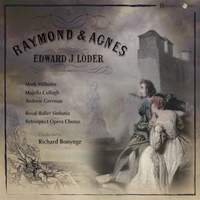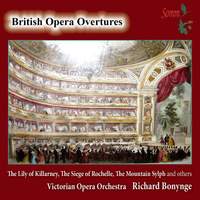Interview,
Richard Bonynge on Edward J. Loder
 I must admit that there was a certain amount of gentle mockery from some quarters in the office when I suggested that we test-drive the world premiere recording of an English grand opera entitled Raymond and Agnes - but whilst the title may sound a trifle banal, much of Edward Loder’s 1855 score packs a real punch, with echoes of Weber’s Der Freischütz, Meyerbeer’s Robert le diable and even Verdi’s Il trovatore (which premiered just two years earlier) playing out in this melodramatic tale of Byronic baronets, Andalusian bandits and spectral nuns.
I must admit that there was a certain amount of gentle mockery from some quarters in the office when I suggested that we test-drive the world premiere recording of an English grand opera entitled Raymond and Agnes - but whilst the title may sound a trifle banal, much of Edward Loder’s 1855 score packs a real punch, with echoes of Weber’s Der Freischütz, Meyerbeer’s Robert le diable and even Verdi’s Il trovatore (which premiered just two years earlier) playing out in this melodramatic tale of Byronic baronets, Andalusian bandits and spectral nuns.
Premiered at Manchester’s Theatre Royal, the work transferred to London briefly but wasn’t resurrected until a century later, when musicologist Nicholas Temperley mounted a revival in Cambridge to significant critical acclaim - The Observer praised the score’s ‘sustained dramatic attack’, and Andrew Porter Loder’s ‘skilful, often imaginative orchestration’. At the time of the Cambridge performances the original libretto was thought lost, but it was rediscovered in the course of preparations for Loder’s bicentenary, and last October the work received its world premiere recording in a new performing edition by Valerie Langfield, with veteran Australian conductor Richard Bonynge (who together with his late wife Joan Sutherland was a key figure in the twentieth-century revival of Massenet and bel canto) at the helm. Now 87, Bonynge maintains a hectic international performance-schedule and rarely gives interviews – so it was a real privilege to chat to him about Loder’s influences and innovations, and his theories on why the opera never achieved the recognition it deserved.
Loder was born in England but studied in Germany - do you feel that he's very influenced by German Romanticism in Raymond and Agnes, or is there also an element of looking back to the Italian bel canto tradition?
There’s a bit of everything in there, really! This piece was a genuine surprise to me, because the only other Loder that I knew was the overture to The Night-Dancers, which I recorded a few years ago. Loder was obviously very well acquainted with the great scores of the day, and they all have their influence on him: Raymond and Agnes is certainly inspired in part by bel canto, and by Irish composers like Michael William Balfe and William Vincent Wallace, but there’s also a good bit of Weber and a bit of Mendelssohn in there! To be quite honest, there aren’t that many really splendid English composers of the nineteenth century, but Loder, I think, should certainly be up there with them: when I first looked at the piano score I wasn’t that overwhelmed, but when I got the orchestral score that made a lot of difference.
His orchestration is very interesting and very 'right' as far as the singers are concerned; there’s some wonderful wind writing in particular, and whilst it’s the same sort of orchestration as the other composers of the day (again, Mendelssohn and Weber spring to mind), there are certain passages where it seems slightly more advanced in a way. It’s also quite a large-scale opera - I was amazed at just how big it was when I started really looking at the orchestral score – and it’s hardly been performed at all since the premiere and subsequent London revival shortly afterwards. His orchestration is very interesting and very 'right' as far as the singers are concerned; there’s some wonderful wind writing in particular, and whilst it’s the same sort of orchestration as the other composers of the day (again, Mendelssohn and Weber spring to mind), there are certain passages where it seems slightly more advanced in a way. It’s also quite a large-scale opera - I was amazed at just how big it was when I started really looking at the orchestral score – and it’s hardly been performed at all since the premiere and subsequent London revival shortly afterwards. As far as I know this is the first complete recording, and I think Nicholas Temperley and Valerie Langfield did a very interesting thing in digging this one up: Nicholas brought the piece back onto people’s radars when he staged a revised version in Cambridge in the 1960s (before the libretto had even been unearthed), and Valerie produced the performing editions which we used for this recording, which included editing the manuscript and incorporating the libretto. Loder’s got a great deal to say, and I’m so glad we recorded it!
In terms of that 'slightly more advanced' quality, do you see Loder looking forward to later Verdi or Wagner at all?
Wagner perhaps more than Verdi, though only very slightly. All these composers from around that time get to sound a little like one another in places: it’s inevitable, given there are only so many notes in a scale!
You mentioned Balfe and Wallace, the former being best known for 'I Dreamt I Dwelt in Marble Halls' from The Bohemian Girl (premiered just under a decade before Raymond and Agnes) – does Loder serve up an equivalent hit in this score?
To me Balfe and Wallace (especially Wallace) could write the great tunes, and I don’t think Loder is quite their equal as a melodist, but in other respects he’s certainly as good – his sense of drama and of what is right for the voices is really quite marvellous. I'm always wary of making comparisons, as these things are so often a matter of personal taste, but I don’t think Raymond and Agnes has an aria quite like 'I Dreamt I Dwelt in Marble Halls' – that was a real one-off!
I also heard some echoes of Meyerbeer in one or two places - and even found myself wondering whether Sullivan's Ruddigore borrows from Loder in a slightly tongue-in-cheek way...
Meyerbeer had a huge influence on many composers of this period, simply because he had such a long career, and he too was a little in advance of his time – I was put in mind of some of the Meyerbeer operas here and there, but it’s so hard to put your finger on it. And of course everybody had an influence on Sullivan, especially Offenbach and Auber! I would think it’s perfectly possible that he’d come across Loder too whilst he was studying in London.
Do you have any theories on why the opera never really took off? Was it perhaps hamstrung by its rather creaky libretto?
Perhaps the libretto played a part, but I think it’s also down to the simple fact that it’s a very difficult piece – you can’t put it together as easily as you would a Balfe or a Wallace. It’s a great deal more complicated to perform: there are lots of parts, so it would be quite expensive to do well, and I think perhaps that meant that it didn’t get a very good start in life…But the same is also true of quite a few works by the great bel canto composers of the day: Donizetti’s Les Martyrs was neglected for almost two centuries, as was a lot of Bellini and early Verdi.
Do you have any plans to resurrect more operatic rarities on record?!
There's still so much music of this period to be excavated: it feels as if people keep unearthing new operas all the time these days! Just the other week I heard Donizetti’s L’Ange de Nisida at Covent Garden, a fabulous opera which was being performed for the very first time. I'd venture to say that there are also plenty of scores which should probably remain buried, but there are certainly plenty of good pieces out there from the mid-nineteenth century which really do deserve to be heard - I don’t know whether I’ll find too many more myself, as I’m getting on in age a bit now! But hopefully we’ll go ahead and do some more Loder, because it would be interesting to discover more about him. I’ve since looked at the rest of The Night-Dancers and it’s quite a charming piece; it has an absolutely lovely libretto, because it’s based on Giselle, which is what attracted me to it in the first place. There are several song-covers available from the nineteenth century, so it must have had a certain amount of success in its day, I think!
Loder: Raymond & Agnes
Majella Cullagh, Mark Milhofer, Andrew Greenan, Carolyn Dobbin, Quentin Hayes; Retrospect Opera Chorus, Royal Ballet Sinfonia, Richard Bonynge
Raymond and Agnes was released on Retrospect Opera on 10th August.
Available Format: 2 CDs
Music by Loder, Balfe, Wallace, MacFarren, Barnett and Benedict
Available Formats: CD, MP3, FLAC




